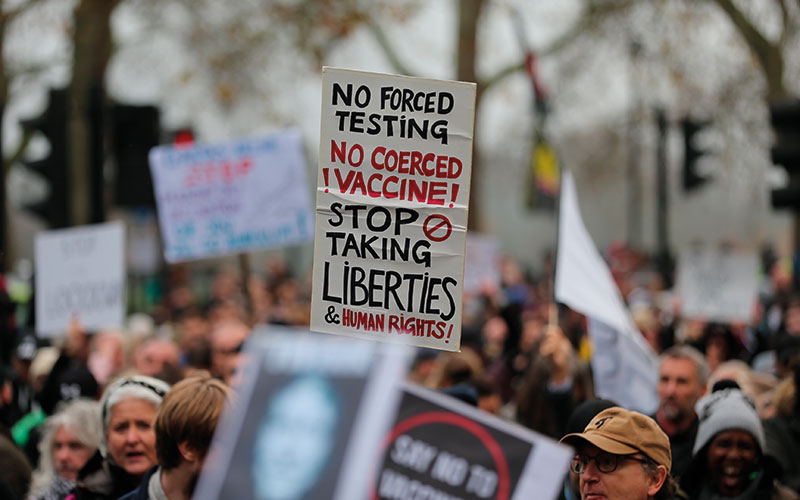With mass immunisation programmes now here, Dr Daisy Fancourt talks us through research that shows worrying levels of public suspicion around vaccines.

As 2020 came to a close, the imminent approval and deployment of three COVID-19 vaccines (AstraZeneca/University of Oxford, Pfizer/BioNTech and Moderna), all developed and tested at unprecedented speed over the past six months, makes 2021 look a little more hopeful.
But this optimism is tempered by a big fly in the ointment – an apparent widespread suspicion among the public towards vaccines. Countering the arguments of a small hardcore of extreme anti-vaxxers would be one thing, but overcoming the mistrust and hesitancy of a much larger part of the population will be quite another.
The size of this group of people was brought to light back in September by the ongoing University College London COVID-19 Social Study. It reported that almost a third (32%) of the 70,000-plus UK participants said they are either “unlikely” or “very unlikely” to accept a COVID-19 vaccine when it becomes available. Just under a half (49%) said they are “very likely” to have the vaccine.
Doubts and suspicions
The study lead is Dr Daisy Fancourt of UCL’s Institute of Epidemiology and Health Care. She says from the moment the research started, just before the first lockdown in March, the team became aware of reservations and anxiety towards potential vaccines. “I think the proportion of people who ultimately said they are actually unwilling to take the vaccine was quite low,” she says, “but the ones who are hesitant, they are the ones that we really should now be focusing on.”
The research also found while doubts and suspicions were varied, they all led back to false and misleading information. “We looked at lots of different predictors,” says Fancourt. “One of them is the relationship between misinformation and mistrust or hesitancy. We found a strong relationship here. For example, we had people who believe that vaccines don’t work, or people who believe that vaccines might have dangerous side effects in the future, or believe that it’s better to have natural immunity than vaccine-induced immunity or that vaccines are just a commercial ploy to make money. These people were much more likely to be either hesitant or unwilling to have the vaccine. That suggests that if we could help to combat some of that misinformation and help to educate people about what the vaccines are, how they work, why they’re safe and so on, then we might start to see some of that hesitancy reducing.”
The ones who are hesitant, they are the ones that we really should now be focusing on
Improving communication
Misinformation was also at the heart of the MMR vaccine scare of the late 1990s, and though the data linking the vaccine to autism was subsequently discredited, the doubts it placed in the public mind have been much harder to dislodge. More than 20 years later, the seeds of suspicion are sewn more widely than ever via social media and other digital technology.
“Most of these people genuinely believe that vaccines are not safe or that there is something dangerous or devious about them,” says Fancourt. “It’s not about seeing them as the enemy but rather trying to see that we need to improve the communication. They are getting information that’s not true, that’s worrying them, and they are making decisions based on that false information.”
While understanding the reasons for vaccine hesitancy is a start, how do we begin to improve the communication and dispel those doubts and misconceptions?
“One thing we can do is to make much more information public,” says Fancourt. “Let’s tell people about the processes for testing vaccines, how their safety is checked and what they actually do to us. We’ve heard a lot about how the vaccine process has been sped up, which has caused some people to be concerned that safety steps have been missed out. That isn’t the case, but we need to explain the hurdles that vaccines have to jump to prove that they are safe.”
The authorities have a key role to play here, though a big problem with any messages emerging from perhaps the most vital source, central government, is that public trust is currently so low. To overcome this, says Fancourt, the messages need to come from lots of different points of origin.
“People need to get the information from sources they trust. That might be local community-based groups. It might be social media influencers. Whatever, it’s about having a plurality of voices because different people will trust different voices. We have to be strong in presenting what the facts are. It can be difficult to combat fake news, but we just need to make sure there are consistent, clear messages about the safety of vaccines and why they work.”
Building trust
While more and better official information is clearly paramount, how do people discern the difference between what’s real and what isn’t? “It can be difficult because some sources can look genuine. Also, when fake news is circulated by people who are figures of trust, that can make it even harder. But I think the point needs to be made that if you see something that sounds bad or might be scaremongering, check where it has come from. See if it originates from a proper authoritative source.”
Other potential sources of accurate information are existing vaccine programmes that people trust and use. “These existing resources are effective at reaching people. People trust these voices because they might already be getting vaccines from those same sources. So mobilising those traditional sources, such as health services, and then bringing in the social media influencers and community resources, will make sure that we’ve got lots and lots voices out there who can vouch for the accurate information on these vaccines.
So does Fancourt feel we can begin to feel positive about 2021? “That we have several strong vaccine candidates is good news. I am hopeful. The mass vaccination will be a big logistical challenge. A lot of the success of the next year will depend on how well the authorities manage to publicise, explain and organise that vaccination programme.”
Daisy Fancourt
- Associate Professor of Psychobiology and Epidemiology, UCL
- Studied at King’s College London and University of Oxford
- PhD in psychoneuroimmunology
- Her research focuses on the effects of social factors on health
- Consultant to WHO on arts and health.




